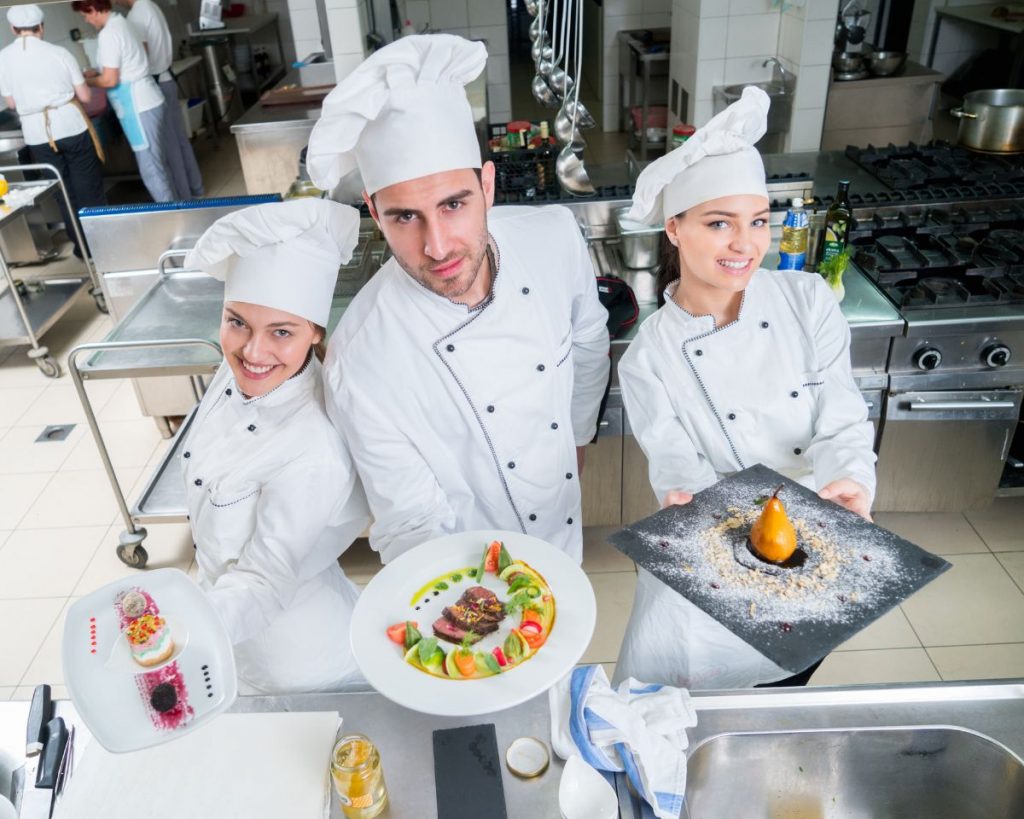Do you have a passion for food and want to take your passion to the next level? You may have even started looking at culinary programs and might be thinking “what jobs can you get after culinary school?”
The good news is there are numerous career options to join the culinary industry after training. The more obvious choices would be some type of cook, or perhaps a sous chef, but there are so many more options! Let’s take a look at what culinary jobs you can do after training.
Start your Culinary Arts training by contacting us today!
Back of the House Culinary Roles
Most restaurants have a front of the house and a back of the house. The back of the house is the rear area of the establishment that cooks and prepares the food. Although many don’t see this area when dining, it’s these kitchen and food prep sections where the action happens.
One can do many culinary jobs in the back of the house after training. Some work on cooking and preparing food while others help the kitchen work efficiently to get meals to diners fast. Here are a few back-of-the-house culinary jobs:
Food Prep – includes many routine tasks under the direction of cooks, chefs, or food service managers. They prepare cold foods, slice meat, peel and cut vegetables, brew coffee or tea, and perform many other food service tasks [1].
Expediter – manages projects across the various divisions of a restaurant, from accelerating food service to managing supplies to streamlining communication. The food expeditor is a go-between the waitstaff and the kitchen staff, ensuring the smooth operation of all restaurant departments.
Line Cook – works in specific stations or areas of the kitchen. Depending on the size of the kitchen, they may have multiple line cooks for entrees, desserts, etc. Line cooks can work at any part of the kitchen’s operations, including food prep, cooking, cleaning, and plating.
Front of House Culinary Roles
The front of the house is the area seen by the public in a restaurant. That can include the dining room, lobby, bar, and lounge. In front of the house, culinary roles focus on taking orders, serving meals, and customer service. It’s a friendly and personable area that requires a warm and inviting environment to appease paying customers. While those who complete culinary training would be less likely to work in front of house roles, it may still be an option.
Front of House Manager – oversees the front of the house. They run the dining room operation including the servers, bar, table bussing and many more vital tasks for a clean and efficient restaurant. They may also review and tabulate the restaurant’s receipts and record the day’s earnings.
Headwaiter/Captain – some larger restaurants may use a head waiter to supervise the waiters and waitresses taking orders and serving food. They may also work their own tables, or act as a supervisor and report to the front-of-house manager.
Servers – are the waiters and waitresses that greet diners at the table, take orders, answer menu questions, and serve food. They also communicate with the management and kitchen, prepare dining checks, and collect payment.
Host/Hostess – work in the front of the restaurant to greet and seat customers at their tables. They also take reservations, answer phones, and coordinate with the kitchen and wait staff to ensure the proper flow of diners and troubleshoot issues in the restaurant’s operations.
Get the culinary training you need to kick start your career today!
Personal Chef
After graduating from culinary school, being a personal chef is a distinctive and lucrative career path. As a personal chef, you can collaborate closely with customers and design meals just for them, whether they are a young family, a busy professional, or someone unable to prepare food for themselves.
As a private chef, you might only have one client, occasionally be required to travel with them, and frequently tailor food preparation to accommodate special dietary requirements. This is a fascinating career choice if you enjoy the variety and challenge of owning your own small business.
Traveling or Mobile Chef
A traveling chef may be required to accompany clients to provide personal meal planning services, among other duties. On cruises and other vacations, some traveling chefs accept jobs. Additionally, they could offer cuisine coaching to eateries, assisting them in creating menus and starting or expanding a business.
Another aspect of a traveling chef could be owning and operating a food truck. While you may not be traveling around the country, you may find yourself traveling around the city or state you reside in. From stationing at festivals, schools, parks, to even significant events in the city, a mobile food truck owner or cook is always following the crowds of people to show off his unique cuisine.
Get Your Culinary Career Started with Training at Dorsey College
If you’re ready to take your passion for food and turn it into your career let Dorsey College help you get your culinary skills into shape! Our Culinary Arts program is designed to give students the opportunity to embrace their love for cooking through in-class instruction and hands-on training.
Take advantage of our externship program, where you can train with real culinary experts while having the opportunity to network. If you’re ready to take the next step, sign up for culinary arts classes and obtain your diploma in just one year!
Sources:
- https://www.bls.gov/ooh/food-preparation-and-serving/food-preparation-workers.htm#tab-2

